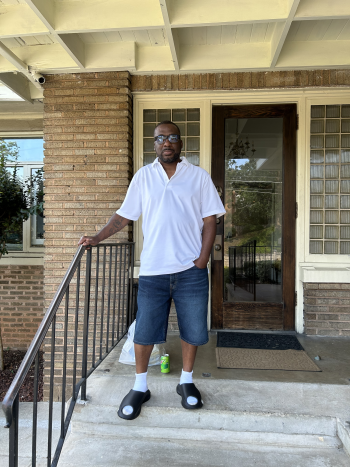Kalvin Michael Smith, a client of the Wrongful Convictions Clinic, dies at 52
Professor James Coleman and other Duke Law faculty, students, and alumni worked with Smith for 20 years to help prove his innocence
 Kalvin Michael Smith
Kalvin Michael Smith
Kalvin Michael Smith, a client of Duke Law School’s Wrongful Convictions Clinic and Innocence Project who fought for two decades to prove he was innocent of a brutal attack on a Winston-Salem woman in 1995, has died. He was 52.
Smith’s 1997 conviction in the robbery and near-fatal beating of Jill Marker became the subject of intense local scrutiny and allegations of police and prosecutorial misconduct and racial bias. He maintained his innocence during 19 years of incarceration.
Smith continued to appeal his conviction after being released from prison in 2016, when a Forsyth County judge granted a motion that his trial attorney had not presented evidence that could have resulted in a shorter sentence.
James Coleman, Jr., the John S. Bradway Distinguished Professor of the Practice of Law and director of the Wrongful Convictions Clinic, began investigating Smith’s case in 2003 on a referral from the North Carolina Center on Actual Innocence. Coleman was joined by three volunteers from the student-led Innocence Project: David Bernstein ’06, Emily Coward ’06, and Joe Davis ’07.
Numerous members of the Duke Law community would later join the team, including Charles S. Rhyne Clinical Professor Emerita of Law Theresa Newman ’88, who co-directed the clinic with Coleman from 2008 to 2021; Clinical Professor Jamie Lau ’09, the clinic’s supervising attorney; alumnus David Pishko ’77, a Winston-Salem trial attorney; and additional student volunteers, clinic student-attorneys, and alumni working pro bono.
In 2004, the Winston-Salem Journal published a series of articles raising questions about Smith’s conviction. Five years later, a citizens review committee formed by the Winston-Salem City Council reviewed the case and concluded that it had no confidence in the police investigation. A subsequent report by former FBI Assistant Director Chris Swecker criticized the police investigation of Marker’s beating and recommended a new trial for Smith.
Smith’s first request for a new trial, in 2009, was denied. His attorneys appealed that decision in state and federal court.
Coleman and Lau filed Smith’s most recent appeal in Forsyth County Superior Court in late 2021, and the case was pending at the time of his death. Coleman called Smith’s death a tragedy.
“Those responsible for administration of the criminal justice system in Michael’s case were more concerned with protecting each other than correcting this miscarriage of justice,” he said. “We could not get them to focus on the facts demonstrating Michael’s innocence; instead, they defended his conviction solely on procedural grounds, without regard to whether he had been wrongfully convicted.”
Read more about the Duke Law community's involvement in Smith's case in "It Takes a Village to Work for Justice," from the Summer 2009 issue of Duke Law Magazine.